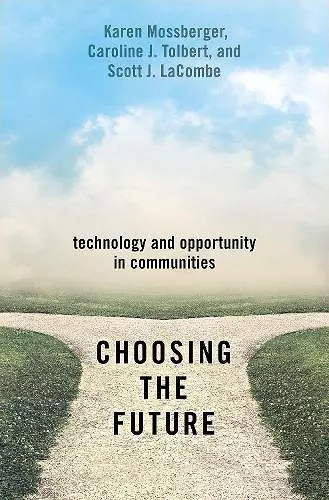Choosing the Future
Technology and Opportunity in Communities
Karen Mossberger author Caroline J Tolbert author Scott J LaCombe author
Format:Paperback
Publisher:Oxford University Press Inc
Published:12th Oct '21
Currently unavailable, and unfortunately no date known when it will be back
This paperback is available in another edition too:
- Hardback£80.00(9780197585757)

Digital information drives participation in politics, the economy, and society. Yet great disparities exist as to which communities have access to the internet. In 2017, only half of residents of formerly industrial Flint, Michigan, had broadband or satellite internet at home, while over 90 percent of those in thriving Sunnyvale, California, in Silicon Valley, were connected. More recently, Covid-19 laid bare these persistent digital divides in both urban and rural communities, illustrating that broadband use is a fundamental resource for the future of opportunity in communities. While previous studies have examined the impacts of broadband infrastructure, they have indicated little about the extent to which local populations can afford and use the technology. Moreover, there has been limited scientific evidence on how broadband adoption matters for collective benefits. Including new data on broadband subscriptions from 2000-2017, and comprehensive analysis for U.S. states, counties, metros, cities, and neighborhoods, Choosing the Future argues that broadband use in the population is a form of digital human capital that benefits communities as well as individuals. Broadband has a causal impact across all types of communities--for economic prosperity, growth, income, employment, and policy innovation. Yet there are urban neighborhoods and rural counties where as little as one-quarter of the population has a broadband subscription, even when mobile is included. As we build "smart" cities and communities, as economies and jobs continue to experience rapid change, and as more information and services migrate online, it is communities with widespread broadband use that will be best positioned for inclusive innovation, with the digital human capital to thrive.
The United States is embarking on a major transformation through infrastructure. The timely research in this volume on broadband access, inclusive innovation, smart cities, and the future of work will comprise a vital source of knowledge and direction for policy makers, researchers, and those building our future. With their usual rigorous attention to detail, the authors explain in depth how inclusive broadband and digital human capital comprise essential dimensions of infrastructure for economic wellbeing. * Jane Fountain, University of Massachusetts Amherst *
This data-intensive and rigorously evidence-based book conducts a forensic examination of the digital drivers of innovation and inequality in communities across the US over 20 years. Given the growing need for digital innovation—and the spiralling importance of digital inequality—during the pandemic, it could not be more timely. Society needs this book! * Helen Margetts, Oxford Internet Institute *
Choosing the Future intelligently grapples with the complicated intersections of technology, opportunity, and innovation. It's a timely book about subjects that will occupy us for the duration of the 21st century. Giving life to the phrase human capital, the authors combine data on broadband use with on-the-ground stories to begin to explain where inequality has been and is headed in the future. I highly recommend this to social planners, scholars, and policymakers trying to come up with the tools to solve the most pressing problems of work, education, and community. * Sharon Strover, The University of Texas at Austin *
The impact of technology on inequality is one of the most important challenges facing the US. In this book, Mossberger, Tolbert, and LaCombe compile extraordinary broadband data over nearly two decades to show wide and persistent inequalities. Their analysis is a tour de force that should be read by those in government, business, and academia. Their recommendations on ways to reduce inequality should be taken seriously by all. * Darrell West, Brookings Institution *
- Winner of Winner, Goldsmith Book Prize, Shorenstein Center, Harvard University.
ISBN: 9780197585764
Dimensions: 157mm x 236mm x 15mm
Weight: 363g
240 pages